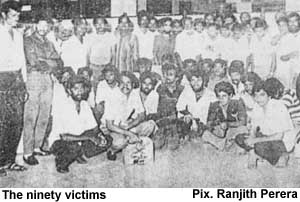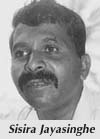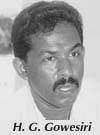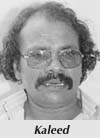 |
 22nd March 1998 |
Front Page| |
Hostage horror in IraqBy Shelani de Silva.For many Lankans the Gulf war saw an end to a life of luxury and prosperity. All their savings vanished overnight, and many fled the country . In all, ninety Sri Lankans were taken hostage as human shields during the siege. For more than two months they were held captive in dark cells with thousands of people from other countries. They lived under the most trying conditions, with no proper meals, being dumped into a cell in which they were barely able to stand. The cramped up cells had the air of a cattleshed. All ninety hostages suffered the trauma of not knowing whether they would be released or whether death would in the end be their fate; as it indeed was for some others. After 56 days in captivity , they were released .But the terrible conditions they underwent would have made a lifetime impact on them. While almost all of them suffered some kind of physical disability, few others who could not accept their fate collapsed mentally . Today after more than eight years , these ninety men are still living the nightmare. Having lost all their savings, some are left high and dry and in debt to Banks. The only hope they had on their return- the promise of compensation is now like some distant dream. Not only did they have to suffer in a foreign land, but now have to fight for their dues. While some were able to pickup from where they left off, others are still without jobs. The main reason being that all their documents were destroyed.
The Sunday Times met a few of them not merely to get a detailed account of the days in captivity , but also to highlight the injustice caused to these men. While two of the ninety died a few years back mainly due to mental and physical disabilities, another lies partially paralysed below the waist, and has been warded at the Kandy hospital for the last several years.
The first three days they were not given any food. Once they were put into the cell they had only water which too was rudely thrown in to the cell. 'They would suddenly appear and throw water into the cell, expecting us to take it into the mouth. All of us would scream and run to the door. I managed to remove my shoe and collect some water, which was shared between the four of us,' he said.
'We had nothing to lose. We knew if something happened we would be killed anyway. We were told at first that if America wages war, we would be killed. Our lives were at stake. After many days we were finally put together. This also gave us some hope. It was so difficult, at one stage we would be crying and then we would start singing or talking about our families just to pass the time,' said Sisira Jayasinghe.
'Unlike other days the place was deserted. I along with another Sri Lankan started on the breakfast. Suddenly two soldiers walked in and wanted to search the place. I knew there was going to be a war, but never thought that they would invade the base. We were taken to a strip of land and asked to kneel. I spotted an Iraqi gun boat, then I realised what was happening,' he said.
They too had not got any food. At the end of their tether, Jayalath had informed the officer's that they should be given some food if they were expected to survive. He volunteered to cook. He was given permission , and with the help of a few Lankan's he cooked rice for the hostages as well as the guards. 'We cant call it a meal. We cooked rice, a tomato paste and onions together. We had to survive on this. Sanitation was another problem'. The toilet was overflowing. We were not allowed to bathe. Worst of all we were not given a change of clothes. All of us wore the same clothes for 56 days ,' he said. Serving food was another pathetic affair. The rice was served on to a tray and they were grouped into ten and asked to eat from the same tray. Tea was served in an aluminum cup which was also shared among ten. It was so humiliating. If one of us drank too much, another would not be able to drink .Tea leaves were introduced to this common cup that went around,' he said. Until now the Sri Lankan government was not aware of the hostages. While all others were being released only the Lankans and the Taiwanese remained. The Lankan's managed to write a letter to the government which was secretly passed out of the cell by a person of another nationality. It was then that plans were made to bring them to Sri Lanka .But that too was another nightmare. They were treated badly. They were treated like criminals, given one passport to return to the island. Although they were promised that they will be given all the valuables once they were released, that did not happen. Back home they once again faced endless ordeals. All hopes of obtaining compensation were dim. Once we got to know that we were getting the compensation we went to the Foreign Employment Bureau to get the relevant details. We filled forms .We came under the 'C' category. But it seems that justice is not done for us here. While others were paid, we who underwent so much suffering were by-passed. We strongly feel that there is some kind of fraud. Someone is preventing us from getting the money' charged Jayalath. Reacting to such allegations Chairman Foreign Employment Bureau Kapila Abeyrathne told The Sunday Times that there was a total of 89 000 people who had applied for compensation. The FEB has to check each application, since there were several who presented false applications. 'Until a few months back I was not aware of their plight. I have already sent a letter to the UNHCR requesting them to give preference to these ninety people.Compensation is paid in two installments. .The first batch consisted of about 19 000 people,' he said. The procedure followed in getting compensation is that a list is sent to the UN. They categorise the people and draw up the list. Once the list is completed it is sent to the FEB. 'We are expecting the list for the second installment in mid April. I am sure these ninety names will be included. I will personally see that they get their money' assured the Chairman. Until that time the ninety Lankans are anxious, depressed slightly hopeful too. |
||
|
More Plus * Delightful discovery
Front Page| News/Comment| Editorial/Opinion| Business| Sports | Mirror Magazine |
||
|
Please send your comments and suggestions on this web site to The Sunday Times or to Information Laboratories (Pvt.) Ltd. |
||
 These
ninety men who lived for fifty six days together encouraging and giving
hope to each other enduring those horrible conditions, have again banded
together to fight for their rights. The organisation named " Ninety
Sri Lankans taken to Custody by Iraqi Authorities '' was formed . Their
main aim is to obtain their compensation in order to get their lives back
on track.
These
ninety men who lived for fifty six days together encouraging and giving
hope to each other enduring those horrible conditions, have again banded
together to fight for their rights. The organisation named " Ninety
Sri Lankans taken to Custody by Iraqi Authorities '' was formed . Their
main aim is to obtain their compensation in order to get their lives back
on track. Sisira
Bandula Jayasinghe was employed as a security officer in Kuwait .On August
2 he along with two other Sri Lankans were proceeding to his office which
was close to the border. They were captured by the Forces and taken to
an underground cell .At first they had been told that they will be released,
but they definitely didn't suspect that this dingy cell with no sunlight
would be their home for several months.
Sisira
Bandula Jayasinghe was employed as a security officer in Kuwait .On August
2 he along with two other Sri Lankans were proceeding to his office which
was close to the border. They were captured by the Forces and taken to
an underground cell .At first they had been told that they will be released,
but they definitely didn't suspect that this dingy cell with no sunlight
would be their home for several months. After
a few days more Lankans were brought in and dumped in to the same cell.
There were 58 Lankans. But they were not aware that another thirty two
were kept in another cell in the same compound. It was quite by chance
that they got to know of the other group. Due to the terrible conditions
most of them contracted diarrhoea periodically .After a few weeks in captivity,
a person from the 58 group contracted diarrhoea which became acute. With
the greatest difficulty they had persuaded the guards to take him to a
doctor. By this time another from the group of 32 had the same problem.
Once they were taken to the doctor, the two had managed to speak. As they
got to know the presence of each other, both groups had demanded that they
be put into one cell. The Iraqi officials had refused point blank, saying
that Sri Lankans were very intelligent and that they feared they would
draw up a plan to create problems. This excuse was not accepted, and the
groups carried out a hunger strike.
After
a few days more Lankans were brought in and dumped in to the same cell.
There were 58 Lankans. But they were not aware that another thirty two
were kept in another cell in the same compound. It was quite by chance
that they got to know of the other group. Due to the terrible conditions
most of them contracted diarrhoea periodically .After a few weeks in captivity,
a person from the 58 group contracted diarrhoea which became acute. With
the greatest difficulty they had persuaded the guards to take him to a
doctor. By this time another from the group of 32 had the same problem.
Once they were taken to the doctor, the two had managed to speak. As they
got to know the presence of each other, both groups had demanded that they
be put into one cell. The Iraqi officials had refused point blank, saying
that Sri Lankans were very intelligent and that they feared they would
draw up a plan to create problems. This excuse was not accepted, and the
groups carried out a hunger strike. Jayalath
Weragoda who was in the 32 group was the person who managed to talk to
establish contact with the other Sri Lankans from the other group who had
come to meet the doctor. Jayalath who was working for a catering company
was attached to the Kuwaiti Naval Base. He was the chief at the Base. Having
left Sri Lanka in May1990, Jayalath was earning a good salary. Having to
prepare breakfast for the 600 odd officers, he had arrived at the kitchen
around 5.00 am on August 2.
Jayalath
Weragoda who was in the 32 group was the person who managed to talk to
establish contact with the other Sri Lankans from the other group who had
come to meet the doctor. Jayalath who was working for a catering company
was attached to the Kuwaiti Naval Base. He was the chief at the Base. Having
left Sri Lanka in May1990, Jayalath was earning a good salary. Having to
prepare breakfast for the 600 odd officers, he had arrived at the kitchen
around 5.00 am on August 2. They
were first taken by bus and then transported to Baghdad by train. It had
been around 2.00 am when they reached the cell. Blindfolded they were thrown
into a dark cell. It was so crowded with other people that they all stumbled
upon each other.
They
were first taken by bus and then transported to Baghdad by train. It had
been around 2.00 am when they reached the cell. Blindfolded they were thrown
into a dark cell. It was so crowded with other people that they all stumbled
upon each other.
